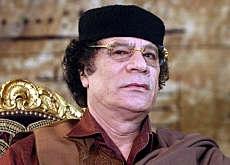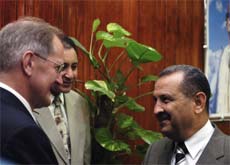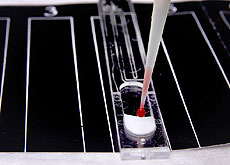Gaddafi fingers Swiss doctor

Libyan leader Moammar Gaddafi has implicated a Swiss doctor in the case of six foreign medics accused of causing an Aids epidemic in a Libyan hospital.
In May 2004 Libya sentenced to death five Bulgarian nurses and a Palestinian doctor for deliberately infecting more than 400 Libyan children with HIV.
The medics, who arrived in Libya in 1998 and worked in a paediatric hospital in the seaport of Benghazi, were arrested in 1999. So far around 50 patients have died of Aids.
On December 25 last year Libya’s Supreme Court scrapped the death sentences hanging over the “Benghazi Six” and ordered a retrial – expected to start in around a month.
Developments then took an unexpected turn earlier this month when Gaddafi told the US-financed Arabic television station al-Hurra he had a copy of a Swiss medical study which proved the virus had been deliberately injected into the children.
“I have seen reports by a Swiss woman doctor saying that the virus is artificial and was created in a laboratory,” he said. “That means the children were deliberately injected with the virus.”
The Swiss foreign ministry denies any knowledge of a female doctor connected to the Libyan case, while the Bulgarian lawyer defending the nurses said Gaddafi might actually have meant a Swiss male doctor.
“I know only one Swiss doctor who has written a study,” said Vladimir Sheitanov. “His name is Luc Perrin.”
Blood samples
Perrin, head of the laboratory of clinical virology at Geneva University Hospital, admitted that he and his team had analysed blood samples from the infected children, but denied that any of his team had ever been to Libya. He also denied any involvement with the accused.
Perrin, one of Switzerland’s most renowned Aids experts, said that soon after the discovery of the Aids infection at the Al-Fateh hospital in 1998, the Libyan representative at the World Health Organization (WHO) had asked him and a team of Swiss virologists to look into the case.
A few children from Benghazi travelled to Switzerland and others sent blood samples. These tests cost SFr20,000 ($15,500), which Libya paid.
The results of the tests didn’t go down particularly well in Tripoli, however. Perrin diagnosed a typical case of hospital infection, common in developing countries, in which blood is taken from one infected child and the same needle used for several other children.
What’s more, Perrin ruled out deliberate infection since “we found many more cases of Hepatitis B and C than HIV”.
Breaking the deadlock
The international view remains that Libya is using the medics as scapegoats for pre-existing poor hygiene conditions at the hospital and as bargaining chips.
Although he backed the guilty verdict, Gaddafi has proposed releasing the six medics on condition a Libyan serving life in a Scottish jail for the Lockerbie bombing is released and $5.7 billion (SFr7.3 billion) is paid to Libya for the care of the HIV-infected patients.
A more likely strategy aimed at defusing the standoff was set to get underway on Saturday in Tripoli. Volunteers, including delegates from Bulgaria and the EU, met the victims’ families and began hammering out details of an aid fund.
But citing evidence that the nurses were tortured to confess and that the epidemic started in the hospital before they began working there, Bulgaria insists the medics are innocent. It has rejected any payout and has distanced itself from the fund, calling it a voluntary rather than political or diplomatic initiative.
Although the fund’s western sponsors and the victims’ families seem to be far from seeing eye-to-eye, the fund can serve as a face-saving vehicle with which both sides can successfully end the dispute, says George Joffe, from Cambridge University’s Centre for International Studies.
“[Bulgaria] can’t afford to admit they are actually giving compensation,” Joffe said. “But my guess is in fact the Libyan authorities will do their best to make sure the families in the end take what is offered, however minimal they think it to be.”
swissinfo
Moammar Gaddafi has been Libyan leader since he led a military coup against King Idris in 1969.
In the 1970s, his regime was implicated in subversion and terrorist activities in Arab and non-Arab countries.
For most of the 1990s, Libya endured economic sanctions and diplomatic isolation as a result of its refusal to allow the extradition to the US or Britain of two Libyans accused of the bombing of an airliner over Lockerbie, Scotland, in 1988.
Recently Gaddafi has attempted to improve his image in the West. Gaddafi firmly denounced the September 11, 2001 attacks and Libya has pledged its commitment to fighting al-Qaida.
Libya is Switzerland’s second-largest trading partner in Africa and provides more than 40% of Swiss crude oil imports.
In 2004 imports from Libya, consisting almost exclusively of petroleum, increased by 4.5% to SFr790 million.
Exports, mainly in the machinery and pharmaceutical industries, soared by 55% to SFr189.5 million in the same year.
Libya has a population of just under six million.

In compliance with the JTI standards
More: SWI swissinfo.ch certified by the Journalism Trust Initiative


You can find an overview of ongoing debates with our journalists here . Please join us!
If you want to start a conversation about a topic raised in this article or want to report factual errors, email us at english@swissinfo.ch.